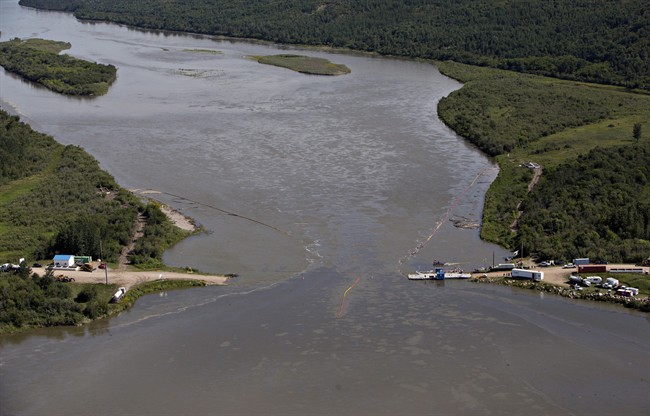It’s been just over a week since around nearly 250,000 liters of oil spilled from a Husky Energy facility into the North Saskatchewan River.

READ MORE: Drinking water measures could be in place for months due to oil spill: official
Around 70,000 residents in a number of communities continue to be affected by the spill – including Prince Albert, North Battleford, Melfort and the Muskoday First Nation.
Nine booms have been placed on the river to try to contain the oil, but there have been questions about how much good the booms are doing.
Peter Prebble is the director of environmental policy at the Saskatchewan Environmental Society and weighed in on Husky Energy’s oil spill.

Q: Do you believe the oil spill has been getting enough coverage, including nationally?
A: I think it’s had excellent provincial coverage, but on the national level, it could have received more coverage. This even deserves to be a major news story right across the country and I think that’s just beginning to happen.
Q: Is this a story that people around the world should know about?

Get breaking National news
The effects have been devastating because of the consequences it’s had.
Q: What impact does the lengthy clean up have on people’s perception of pipelines?
Well, this cleanup is going to need to go on for months.
A: That’s going to be one of the challenges for the provincial government and Husky. Because a lot of this crude is now mixing into the water column and some of it will get into the sediment. It’s sticky and adhesive, it’s changing chemically in nature and it’s going to be difficult to clean up by virtue of that. Unfortunately, Husky didn’t move quickly enough in terms of trying to remove this from the surface of the water right away when they had a better chance to do it. Those efforts were not very successful and this is going to create big problems for them now.
READ MORE: Husky Energy changes day it discovered Saskatchewan oil pipeline spill
Q: In a Global News online poll, the majority of respondents said this spill will not affect their views on supporting pipelines, what’s your thoughts?
Let’s say if it had taken place on the North Saskatchewan River west of Edmonton where more than a million people are relying on the North Saskatchewan for drinking water. How would they have been able to replace their drinking water? You know it would have been impossible.
A: Well, I think that’s understandable in the sense that we know that we have to move oil across the country. Oil by rail is a very unattractive alternative because of the risks of a serious explosion in a populated area. We need to pay a lot more attention to pipeline safety and I think this spill is really underlying a lot of the regulatory inadequacies on that front. The spill could have been so much worse.
You know if it had happened the South Saskatchewan River where 45 per cent of the population of the province relies on the South Saskatchewan for drinking water, this would have had even more devastating effects than it’s already having. What would have happened if it had taken place in winter when it would have been very difficult for Prince Albert to run a line from the South Saskatchewan River to meet their water needs. This could have been much, much worse.




Comments